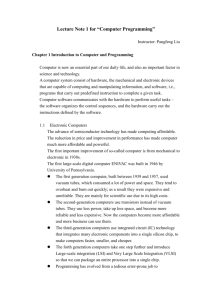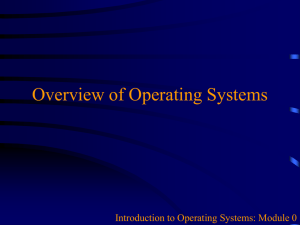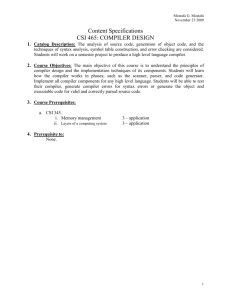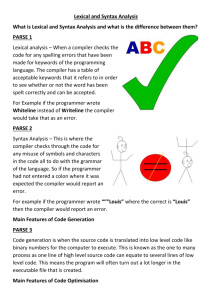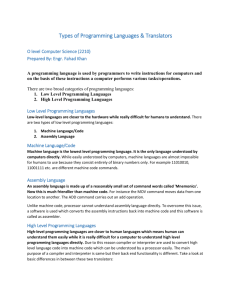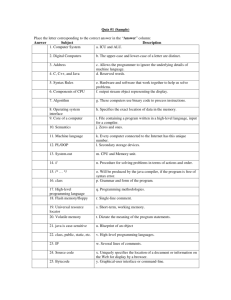Compilers and Interpreters
advertisement
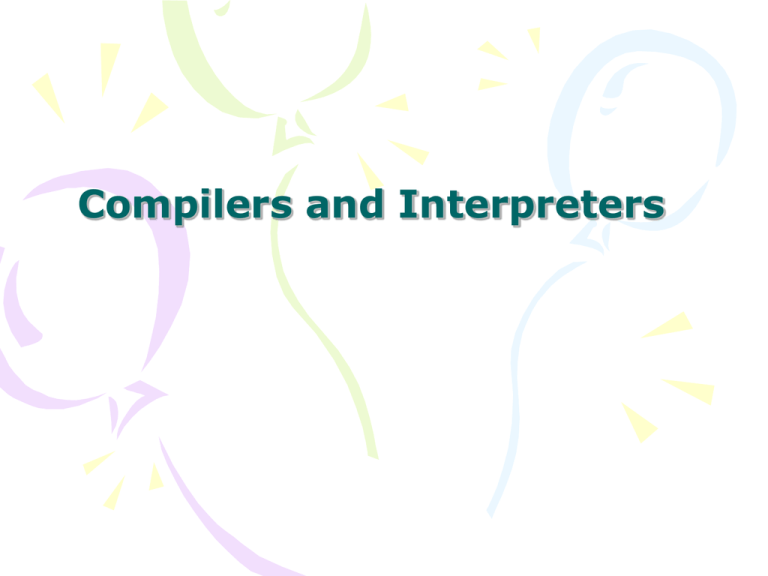
Compilers and Interpreters What's the difference? • Computer programs are compiled or interpreted. Languages like Assembly Language, C, C++, Fortran, Pascal were almost always compiled into machine code. Languages like Basic,VbScript and JavaScript were usually interpreted. • So what is the difference between a compiled program and an Interpreted one? Compiling • To write a program takes these steps: 1.Edit the Program 2.Compile the program into Machine code files. 3.Link the Machine code files into a runnable program (also known as an exe). 4.Debug or Run the Program With some languages like Turbo Pascal and Delphi steps 2 and 3 are combined • Machine code files are self-contained modules of machine code that require linking together to build the final program. The reason for having separate machine code files is efficiency; compilers only have to recompile source code that have changed. The machine code files from the unchanged modules are reused. This is known as Making the application. If you wish to recompile and rebuild all source code then that is known as a Build. • Linking is a technically complicated process where all the function calls between different modules are hooked together, memory locations are allocated for variables and all the code is laid out in memory, then written to disk as a complete program. This is often a slower step than compiling as all the machine code files must be read into memory and linked together. Interpreting • The steps to run a program via an interpreter are : 1. Edit the Program 2. Debug or Run the Program 3. This is a far faster process and it helps novice programmers edit and test their code quicker than using a compiler. The disadvantage is that interpreted programs run much slower than compiled programs. As much as 5-10 times slower as every line of code has to be re-read, then reprocessed. Java and C# • Both of these languages are semi-compiled. They generate an intermediate code that is optimized for interpretation. This intermediate language is independant of the underlying hardware and this makes it easier to port programs written in either to other processors, so long as an interpreter has been written for that hardware. • Java when compiled produces bytecode that is interpreted at runtime by a Java Virtual Machine (JVM). Many JVMs use a Just-In-Time compiler that converts bytecode to native machine code and then runs that code to increases the interpretation speed. In effect the Java source code is compiled in a two-stage process. What is a Compiler? • A compiler is a program that translates human readable source code into computer executable machine code. To do this successfully the human readable code must comply with the syntax rules of whichever programming language it is written in. The compiler is only a program and cannot fix your programs for you. If you make a mistake, you have to correct the syntax or it won't compile. • What happens When You Compile Code?: • A compiler's complexity depends on the syntax of the language and how much abstraction that programming language provides. A C compiler is much simpler than • C++ Compiler or a C# Compiler. Here is what happens when you compile code. • Lexical Analysis: This is the first process where the compiler reads a stream of characters (usually from a source code file) and generates a stream of lexical tokens. For example the C++ code • Next is Syntactical Analysis: This output from Lexical Analyzer goes to the Syntactical Analyzer part of the compiler. This uses the rules of grammar to decide whether the input is valid or not. Unless variables A and B had been previously declared and were in scope, the compiler might say • 'A' : undeclared identifier. • Had they been declared but not initialized. the compiler would issue a warning • local variable 'A' used without been initialized. • You should never ignore compiler warnings. They can break your code in weird and unexpected ways. • Always fix compiler warnings! One Pass Or Two?: • Some languages have been written so that a compiler can get away with reading the source code once and generating the machine code. Pascal is one such language. Many compilers require at least two passes. Why is this? • Sometimes it is because of - Forward Declarations of functions or classes. - How much optimization you require of the compiler. • Assuming that the compiler has successfully completed these stages - Lexical Analysis. - Syntactical Analysis. • The final stage is generating machine code. This can be an extremely complicated process, especially with modern CPUs. • The speed of the compiled executable should be as fast as possible and can vary enormously according to • The quality of the generated code. • How much optimization has been requested. • Most compilers let you specify the amount of optimization. Typically none for debugging (quicker compiles!) and full optimization for the released code. • Code Generation Is Challenging!: • The compiler writer faces challenges when writing a code generator. Many processors speed up processing by using • Instruction Pipelining. • Internal caches. • If all of the instructions within a loop can be held in the CPU cache then that loop will run much faster than if the CPU has to fetch instructions from main RAM. The CPU cache is a block of memory built into the CPU chip that is accessed much faster than data in the main RAM. Caches And Queues: • Most CPUs have a prefetch queue where the CPU reads in instructions into the cache prior to executing them. If a conditional branch happens then the CPU has to reload the queue. So code should be generated to minimize this. • Many CPUs have separate parts for - Integer Arithmetic - Floating Point Arithmetic • So these operations can often run in parallel to increase the speed. • Compilers typically generate code into object files which are then linked together by a Linker program. An introduction to Operating Systems What is an Operating System? • An Operating system is a software that controls a computer. This is not the same as the applications that you create - those are usually only run when you want them. An OS runs almost as soon as the computer is turned on. • Windows is an Operating System, as is Linux and the Apple Mac OS X. • Switching On -When a computer is powered up, the CPU starts running immediately. But what does it run? On most PCs, whether Linux, Windows or Mac, there is a boot program stored permanently in the ROM of the PC. • Booting Up - Each PC motherboard manufacturer writes a boot program for their motherboard. - This boot program is not an Operating System (OS), it is there to load the OS. Its first job is the Power On Start-Up Test (aka POST). This is a system test, first checking the memory and flagging any errors. It will stop the system if something is wrong. Next it resets and initializes any devices plugged into the PC. This should result in the OS being loaded from whichever device has been configured as the boot device, be it Flash RAM, CD-Rom or hard disk. Having successfully loaded the OS, the boot program hands over control and the OS takes charge. Managing the computer • The job of an OS is to manage all the resources in a computer. When user input is received from mouse and keyboard it has to be handled in a timely fashion. When you create or copy a file, the OS takes care of it all behind the scenes. It may store a file in a hundred different places on disk but it keeps you well away from that level of detail. You'll just see one file entry in a directory listing. • An OS is just a very complex collection of programs and nowadays takes hundreds or thousands of man hours to develop. We've come along way since Dos 6.22 which fitted on a 720 Kb floppy and Vista promises to be very large- 9 or 10 Gigabytes Protection and Security • Modern CPUs have all sorts of tricks built into their hardware - for example CPUs only permit trusted programs to run with access to all of the hardware facilities. This provides extra safety. • In Ring 0 protection on Intel/AMD CPUs, the code at the heart of the OS, usually called the Kernel code, is protected against corruption or overwriting by non Kernel applications - the kind you and I write. Nowadays it is rare for a user written program to crash a computer. The CPU will stop any attempt to overwrite Kernel Code • Also, the CPU has several privileged instructions that can only be run by Kernel Code. This enhances the robustness of the OS and reduces the number of fatal crashes, such as the infamous Windows Blue Screen of death. • The language C was developed to write Operating Systems code and it is still popular in this role mainly for Linux and Unix systems. The Kernel part of Linux is written in C. • The operating system is arguably the most important piece of software on your PC.
